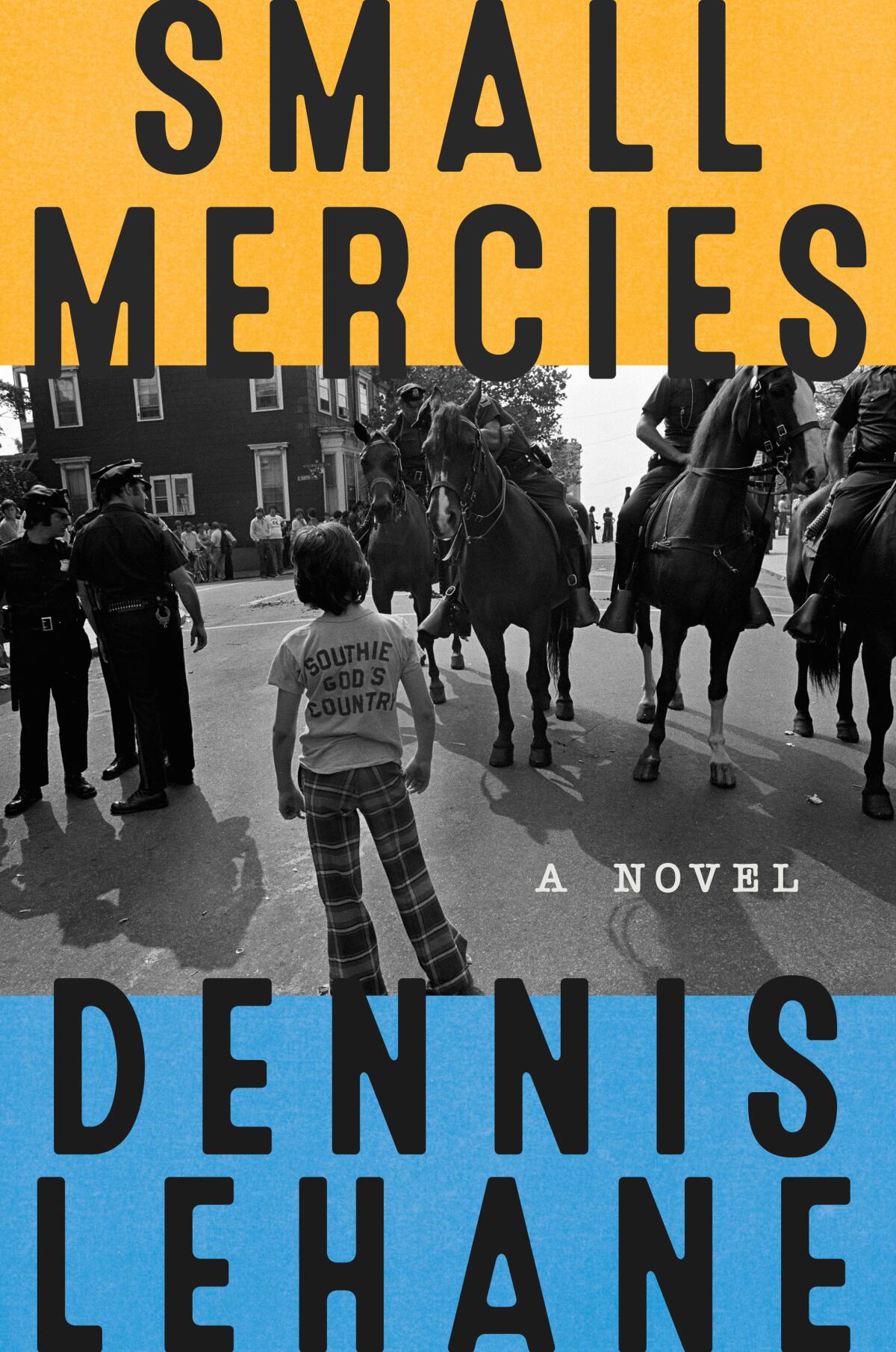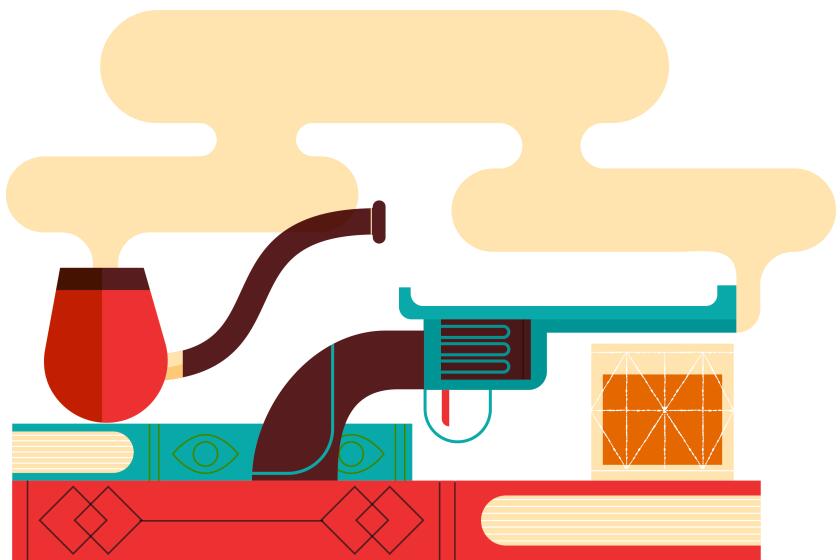Could this be Dennis Lehane’s final novel? It’s certainly one of his best

- Share via
Review
Small Mercies
By Dennis Lehane
Harper: 320 pages, $30
If you buy books linked on our site, The Times may earn a commission from Bookshop.org, whose fees support independent bookstores.
Early on in “Small Mercies,” which may be Dennis Lehane’s final novel if one is to believe his recent interviews, 17-year-old Jules asks her mother, Mary Pat Fennessy, “You ever wonder if there’s some different place?”
The two women are walking the streets of Southie, the Boston neighborhood Lehane has often examined. It’s the summer of 1974, the city lighted to pop as it awaits the desegregation of its public schools through court-mandated busing. Jules is about to enter her senior year of high school, while Mary Pat is a hard 42 — her son, Noel, overdosed after coming home from Vietnam; her first husband, a small-time gangster, had to be declared dead; her most recent husband left her due to her capacity for hatred — and both are suffused with a troubling mixture of rage and yearning.
Jules’ question goes unanswered, Mary Pat is the kind of person who lives only in the moment these days, a cigarette and a beer at a time, maybe a plate of pot roast down at the bar, but other than that? She can’t imagine a life where anyone has the answers to such existential questions. Her life is in Southie. Her life is Southie. Its codes. Its ethics. Its morality. That those things have eroded into a microcosmic world fraught with addiction, violence and overt racism don’t seem to bother Mary Pat. She wishes for a better life for her daughter, just not in a better place.
Nevertheless, the question hangs like a sickle over “Small Mercies,” particularly when Jules disappears on the same night a 20-year-old Black man named Auggie Williamson is found dead under the inbound subway platform in Columbia Station, the victim of multiple head traumas. That Jules was last seen in the same area — along with her minor-league crook boyfriend Rum, best friend Brenda and a drug dealer named George — only heightens concerns. Auggie wasn’t from Southie. Running into Rum and George, that would be bad news for him.

Under normal circumstances, a person would go to the cops if their daughter was missing, but Mary Pat plays by the rules of the neighborhood, opting instead to go to the Irish mob family run by Marty Butler. And for good reason: Rum and George both are connected to Butler, and dropping their names at the precinct could be a death sentence. Problem is, Marty Butler and his crew are leading the fight against desegregation — a clear nod to notorious gangster Whitey Bulger’s role in the actual conflict — and have no time and even less desire to help Mary Pat. Which means Mary Pat needs to take justice in her own hands.
Turns out, Mary Pat is pretty good with her hands.
If this rings somewhat familiar, it’s because it’s the same essential plot turn Lehane used in “Mystic River,” when Jimmy Marcus goes looking for the killer of his teenage daughter, though in this case the power dynamic is reversed. Where Jimmy was the semi-retired king of the streets, a man respected and feared by locals and law enforcement alike, Mary Pat is a middle-aged woman who has begun to feel invisible, who has literally had to fight for everything in her life and who, with her daughter missing, must learn to walk “without falling down.” Luckily, time and memory have turned her into a resourceful woman, one who is “most ecstatic when she’s been wronged.”
The 13 most essential L.A. crime books — from Chandler, Hughes, Mosley and Ellroy to Steph Cha and Ivy Pochoda, with some ‘Helter Skelter’ in between.
It would be easy for Lehane to paint Mary Pat as an empathetic figure while she searches for her daughter, particularly in the middle of such profound social tumult, the city of Boston teeming with aggression. He doesn’t. In fact, she’s just the opposite: Her racism is jarring and accurately portrayed, her anger at Black people seemingly a placeholder for all her losses, real and imagined.
The N-word shows up throughout the novel and Mary Pat’s rationalizations are hard to read, but Lehane’s best work — and this is indeed some of his finest writing, equal to his claustrophobic early novels like “Darkness, Take My Hand” and “Gone Baby Gone” — has always forced the reader to stare long into the most troubling aspects of our culture, our history, our neighbors. That Mary Pat’s arc includes a fundamental emotional change is welcome, but so too is her recognition that her biases and resentment have infected Jules, have spoiled something elemental in the one person left in the world that she truly loved. It’s shocking and moving.
Running parallel to — and eventually intersecting with — Mary Pat’s search is the work Det. Bobby Coyne must do to pierce Southie’s paranoid and corrupt ecosystem of silence. It turns out plenty of people saw Auggie’s final moments, but almost all were beset with amnesia or none-of-my-business-itis, conditions endemic to those who don’t realize there is life on the other side of the bridge or city limits or state line. But that’s the thing about living in what feels like a hermetically sealed box: It’s hard to imagine there’s air anywhere else, much less law and order.
Coyne is a classic Lehane detective: damaged by Vietnam, damaged by drugs, damaged by love. Where a lesser writer might make Coyne into a cliché, Lehane imbues him with an unlikely humanity, a sense of hope that a better world exists, even if he’s not exactly a do-gooder in his own right. Knowing Boston and policing’s future as we do, it’s hard to tell if he’s right or wrong in the choices he makes. Is there a better existence for Bobby Coyne? Maybe. A different life? Certainly. But that life might not come with a badge.
A new collection from author of dark tales Todd Golberg trades urban L.A. noir for the more sprawling menace of the Inland Empire and other exurbs.
It would be a shame if “Small Mercies” was indeed Lehane’s final novel, though the last several years have seen him turned into a much-in-demand TV writer and showrunner, including on 2022’s AppleTV+ hit “Black Bird.” If it really is, it’s a worthy coda to a literary career built on cramped streets filled with unreliable women and men, each trying to find balance in a world of cops and criminals and a town in which you can’t always tell them apart.
Goldberg’s most recent book is the story collection “The Low Desert: Gangster Stories.”
More to Read
Sign up for our Book Club newsletter
Get the latest news, events and more from the Los Angeles Times Book Club, and help us get L.A. reading and talking.
You may occasionally receive promotional content from the Los Angeles Times.












